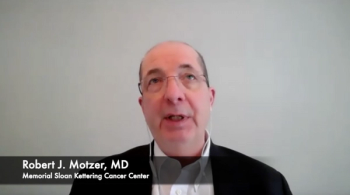
In the CLEAR study, investigators compared lenvatinib plus either pembrolizumab or everolimus versus sunitinib in patients with advanced renal cell carcinoma.

Your AI-Trained Oncology Knowledge Connection!


In the CLEAR study, investigators compared lenvatinib plus either pembrolizumab or everolimus versus sunitinib in patients with advanced renal cell carcinoma.

This article provides a practical perspective on the management of advanced RCC, as well as insight into the current models of risk stratification and ongoing clinical trials. The discussion will focus on the currently available systemic therapies; other strategies that are beyond the scope of this article include active surveillance and metastasectomy.

Newly developed targeted agents in the management of advanced renal cell carcinoma have given us treatment options in this disease not imagined a decade ago.

Listen to internationally regarded oncologist and clinical investigator, Robert J. Motzer, MD, attending physician at Memorial Sloan-Kettering Cancer Center, discuss the past, present, and future trends in renal cell carcinoma.

Prognostic factor models can provide important information to help patients and clinicians make treatment decisions. These decisions have become more complex in the selection of treatment for patients with metastatic renal cell carcinoma (RCC).

Paralleling the increasing use of multikinase inhibitors in the field of cancer therapy, patients and clinicians are confronted with frequently occurring cutaneous side effects associated with the use of these new drugs. Two such targeted agents, sunitinib (Sutent) and sorafenib (Nexavar), were recently approved by the US Food and Drug Administration to treat patients with metastatic renal cell cancer (RCC).

For the past 20 years, the systemic treatment of metastatic renal cell carcinoma (RCC) has been limited primarily to cytokines, with few patients showing benefit. However, recent advances in understanding the pathobiology of RCC have led to the identification of novel therapeutic targets for this disease. Drugs specifically designed to inhibit these targets have been developed, with several showing superior efficacy over traditional cytokine therapy. Moreover, these agents are well tolerated and have improved the span of progression-free, and in some cases, overall survival. As a result, between December 2005 and January 2006, two of these targeted therapies—sunitinib (Sutent) and sorafenib (Nexavar)—were approved by the US Food and Drug Administration for the treatment of advanced RCC. The authors review the clinical trials that have focused on these two drugs as well as those concentrating on two other promising agents, bevacizumab (Avastin) and temsirolimus. The ways in which these novel drugs are changing the standard of care for metastatic RCC and the future directions of RCC clinical trials are also discussed.

Testicular cancer is a highly curable cancer. However, 30% of patients are refractory to standard therapy and will need additional therapy. This article focuses on the use of high-dose chemotherapy in germ-cell tumors.

Surgical resection remains the cornerstone of management for localized renal cell carcinoma. No effective postsurgical adjuvant therapy has been established for